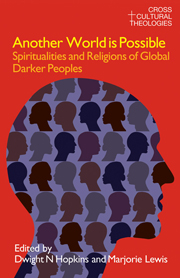Book contents
- Frontmatter
- Dedication
- Contents
- Acknowledgements
- Contributors
- Introduction
- Part I India
- Part II Japan
- Part III Australia
- Part IV Hawaii
- Part V England
- Part VI South Africa
- Part VII Botswana
- Part VIII Zimbabwe
- Part IX Ghana
- Part X Cuba
- Part XI Jamaica
- Part XII Brazil
- Part XIII USA
- 23 Womanist Theology and Epistemology in the Postmodern U.S. Context
- 24 A Home-place: Self-identity and God in African American Culture
- 25 Black Christian Worship: Theological and Biblical Foundations
- Endnotes
- Select Bibliography
- Index of Subjects
- Index of Names
25 - Black Christian Worship: Theological and Biblical Foundations
from Part XIII - USA
- Frontmatter
- Dedication
- Contents
- Acknowledgements
- Contributors
- Introduction
- Part I India
- Part II Japan
- Part III Australia
- Part IV Hawaii
- Part V England
- Part VI South Africa
- Part VII Botswana
- Part VIII Zimbabwe
- Part IX Ghana
- Part X Cuba
- Part XI Jamaica
- Part XII Brazil
- Part XIII USA
- 23 Womanist Theology and Epistemology in the Postmodern U.S. Context
- 24 A Home-place: Self-identity and God in African American Culture
- 25 Black Christian Worship: Theological and Biblical Foundations
- Endnotes
- Select Bibliography
- Index of Subjects
- Index of Names
Summary
In the United States of North America, there are 300 million (legal) citizens. Forty million are people of African descent whose ancestors were forced by violence to come, in August 1619, as private property to Jamestown, Virginia—an English-speaking British colony founded in 1607 in North America. Among black North Americans or African Americans, black Christianity (Protestant and Roman Catholic) is the largest religious expression. Black women make up 70 to 80 percent of African American churches. Moreover, the overwhelming majority of black people relate to the church—through membership, by accepting social services of churches, or by burying family members in churches.
As a second generation black American theologian, this essay explores the experience of worship in African (North) American churches. The aim is to broaden the research areas of black theology by looking at one of the most intimate and vulnerable spaces and times of everyday blacks in the USA—the process of worship.
In Psalm 100 we find: “Shout praises to the Lord, everyone on this earth. Be joyful and sing as you come in to worship the Lord!” (verses 1–2) and “Be thankful and praise the Lord as you enter [God's] temple. The Lord is good! [God's] love and faithfulness will last forever” (verses 4–5).
- Type
- Chapter
- Information
- Another World is PossibleSpiritualities and Religions of Global Darker Peoples, pp. 331 - 345Publisher: Acumen PublishingPrint publication year: 2009

